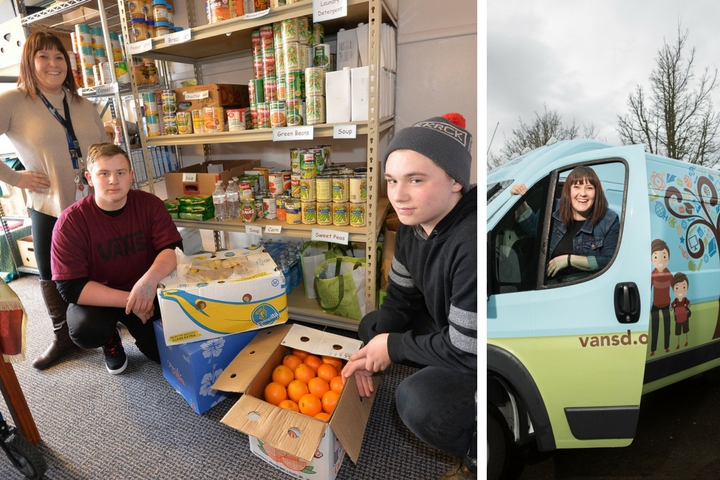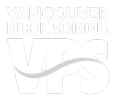
Nicole Loran-Graham, pictured on far left of left photo and in right photo, is the coordinator of VPS’ mobile Family-Community Resource Center, a unique solution to meeting the needs of families who live all over the district. Photos by Paul Quackenbush and Katharine Kimball.
It’s the beginning of March and Shelly, a mother with a young elementary-aged daughter, has recently become homeless. They have spent the last two days living in their car after a temporary living arrangement became unstable, and the mother feared for her and her daughter’s safety.
That’s where Vancouver Public Schools’ Nicole Loran-Graham steps in. As a coordinator for the district’s mobile Family-Community Resource Center, Loran-Graham secures resources to assist families so their children can stay in school.
“The first thing I do is check in with the parent to address their basic needs,” Loran-Graham said. “‘How are you doing? Have you eaten? How are you staying warm? Have you slept?’ Since this family has moved into their car, the child hasn’t been at school, so now she’s missed school lunches.”
Unfortunately, this scenario isn’t unique to this family. And for many families, a crisis such as this is a first-time event. It could come after a job loss, a medical issue or the death of a spouse. No matter the cause, these parents and their children often find themselves in a scary and unstable situation. Stress, anxiety and basic needs affect the parents and their children.
Another working family with four children became homeless when the mother, Nancy, was diagnosed with breast cancer and wasn’t able to work during treatment. Loran-Graham helped them go from losing their apartment to getting into a temporary shelter. The family is now in a program through which they hope to get into an apartment.
“When families go into crisis and lose their apartment or home, it becomes really hard for kids at school, really hard. We see a lot of absenteeism. Kids’ behavior changes. They’re in crisis,” said Loran-Graham. “When families get into housing you see attendance go up, you see stress go down, you see behavior start to improve because the kids are stable.”
The need
Currently, half of VPS students qualify for free and reduced-price meals, an indicator of poverty. Coupled with mobility, homelessness and a lack of nutritious food and health care, poverty has a profound effect on student success. A recent survey of principals at the district’s 36 schools found that affordable housing and nutritious food were top priorities for their families. Mental and behavioral health counseling, hygiene items and clothing also were noted as high needs.
To curb the negative effects of poverty and improve student achievement, VPS leaders have responded by engaging community partners to help remove barriers to learning. Today, 18 Family-Community Resource Centers, staffed by coordinators, help to meet the needs of students and families. The centers are a hub of support, connecting children and their parents with necessary resources such as food, clothing, school supplies, housing and health care. The centers also focus on engaging families in their children’s learning by hosting family nights, parenting classes and early learning activities for parents and their toddlers and preschool children. The mobile FCRC was added last year, taking these services on the road to serve students and families in the 18 district schools without a site-based center.
A framework of support
Coordinator Loran-Graham considers herself a point person in linking the resources of the greater community to provide direct aid to children and families. She travels an average of 71 miles per week setting up fresh food pantries; picking up donated clothing and personal hygiene items from faith-based partners, fire departments and social service organizations; and setting up pop-up shops where school employees can pick up school supplies, backpacks, clothing and hygiene items for their students. The district couldn’t do it without its community partners, which number in the hundreds.
“When I ask community partners to fill a need, there is always an overwhelming response of ‘How can I help?’” said Loran-Graham.
In the past, teachers, counselors and administrators have stepped up to meet their students’ needs. Even in schools with low levels of poverty, there are students who lack basic necessities. The mobile FCRC is a valuable resource for schools without a dedicated center.
“The mobile FCRC has enabled us, literally, to mobilize resources and services in support of students and families,” said Tamara Shoup, director of family engagement and Family-Community Resource Centers. “When teachers or other school staff identify a non-academic barrier to learning, like food, housing, clothing or health, we can come alongside them to help navigate resources to address their most immediate need and connect them to longer term support services. Sometimes this is getting the resources to the school, other times it is listening and learning from the parents and helping them connect to social service agencies.”
Said Eisenhower Elementary Principal Jennifer Blechschmidt, “Nicole has unique skills that allow her to connect with families. She works with them one-on-one to meet an array of needs. She listens and she’s incredibly responsive. The end result for us at Eisenhower is that students are able to come to school and focus on learning, and our teachers are free to focus on teaching.”
A culture of hope
Loran-Graham and the other 18 FCRC coordinators are making a difference in the lives of children and families. VPS’ commitment to remove barriers to learning has resulted in decreased mobility, improved attendance, achievement gains and rising graduation rates. At times, the needs can be overwhelming and the rewards aren’t always immediate, but the effort is critical. The FCRC coordinators are often a lifeline for families.
Shelly and her daughter, who were living in their car, are now in a temporary but safe living situation, and the daughter is back in school. Nancy and her family are in shelter and awaiting an opportunity to get into housing. The four children are in school.
“The families I work with, they’re resilient beyond all belief. They don’t give up. They talk to me about situations and I’m blown away by what they are encountering, and they’re positive, they’re still positive,” said Loran-Graham. “They are trying to figure out, ‘How do we make it? What do we do? What is the next step?’ That is humbling to watch and to see that happen.”
Thanks to Loran-Graham and others like her, all families, no matter their circumstances, have hope for their children and their future.
Said one parent who credited Loran-Graham for her efforts to help families who are less fortunate, “I know this firsthand as my family is homeless at the moment. I will be forever grateful to her for her help, her compassion, empathy and knowledge. If it were not for her and Gaiser Middle School’s resources, my family would have no hope. I will be paying everything forward once my family is back on our feet.”
This and other stories originally appeared in the May 2017 issue of Inside Vancouver Public Schools.
FCRC partnerships
Direct donations:
- $142,075 Foundation for VPS
- $17,431 cash
- $257,645 in-kind
Donors:
- 8 foundations
- 21 organizations
- 48 faith-based groups
- 81 businesses
- 491 individuals
Impact:
- 540 families received holiday food support, totaling $27,006 in partner assistance
- 485 hours of family engagement activities offered; 3,930 adults and 4,200 children participated
- 4,000 pounds of donated food distributed by the mobile FCRC
Did you know?
The mobile FCRC received the 2017 Magna Award Grand Prize given by the National School Boards Association in March.
